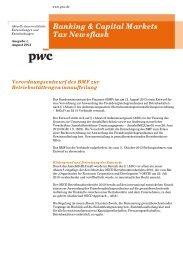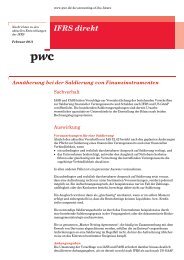Emerging Trends in Real Estate® Europe 2012 - PwC
Emerging Trends in Real Estate® Europe 2012 - PwC
Emerging Trends in Real Estate® Europe 2012 - PwC
You also want an ePaper? Increase the reach of your titles
YUMPU automatically turns print PDFs into web optimized ePapers that Google loves.
tice at the peak of the market of agree<strong>in</strong>g to enter <strong>in</strong>to swaps<br />
that are longer than the life of the loan, sometimes by a significant<br />
period. Furthermore, some closed-end funds entered<br />
<strong>in</strong>to swaps that are longer than the life of the fund. Lenders<br />
are reluctant to take action that would trigger break costs and<br />
losses, particularly as the beneficiary of the upside is often not<br />
the orig<strong>in</strong>al lender.<br />
The Opportunity. The process of deleverag<strong>in</strong>g coupled<br />
with an environment <strong>in</strong> which new debt will be significantly<br />
less available creates opportunities both for those with<br />
equity to deploy and for those who could potentially become<br />
new providers of debt. As one equity <strong>in</strong>vestor commented:<br />
“Borrow<strong>in</strong>g is hugely challeng<strong>in</strong>g at the moment, and the<br />
banks are under massive pressure to offload assets. We do<br />
not rely on leverage to buy assets, although we do look at<br />
exist<strong>in</strong>g debt as an asset when the opportunity arises. We see<br />
debt as a strategic tool rather than a way to generate returns.<br />
The current issues affect<strong>in</strong>g the banks are an opportunity for<br />
us <strong>in</strong> two ways. Firstly, we th<strong>in</strong>k that there will be a significant<br />
<strong>in</strong>crease <strong>in</strong> the rate of disposals by the banks, particularly of<br />
loan books. This is a market <strong>in</strong> which we can participate. The<br />
pressure on the banks is also reduc<strong>in</strong>g the amount of available<br />
debt <strong>in</strong> the market. This impacts more dramatically other<br />
buyers who are more reliant on debt than us. We see a market<br />
<strong>in</strong> which the lack of availability of debt and the pressure on<br />
banks create both a buy<strong>in</strong>g opportunity and a reduction <strong>in</strong> the<br />
level of competition.”<br />
Consensus was almost universal among those <strong>in</strong>terviewed<br />
that the pressure on the banks would create opportunities<br />
for others to become providers of debt. However, significant<br />
differences of op<strong>in</strong>ion existed as to the detail: who, how much,<br />
when, and on what terms?<br />
New Sources of Debt. In the op<strong>in</strong>ion of many of those<br />
<strong>in</strong>terviewed, the most immediate opportunity appears to be<br />
the provision of mezzan<strong>in</strong>e debt. The retreat of the banks is<br />
open<strong>in</strong>g a gap <strong>in</strong> the capital structure. When senior lenders<br />
were provid<strong>in</strong>g debt at 80 percent or even higher LTV, few<br />
borrowers needed mezzan<strong>in</strong>e debt. Risk aversion and regulation<br />
push<strong>in</strong>g banks down to LTVs of 60 percent or lower are<br />
creat<strong>in</strong>g an open<strong>in</strong>g. Interviewees, <strong>in</strong>clud<strong>in</strong>g the mezzan<strong>in</strong>e<br />
providers themselves, cited two major concerns. First, the<br />
mezzan<strong>in</strong>e lenders need active senior lenders beh<strong>in</strong>d whom<br />
to provide mezzan<strong>in</strong>e product. Several of those <strong>in</strong>terviewed<br />
expressed the concern that the retreat of the banks could turn<br />
<strong>in</strong>to a rout, leav<strong>in</strong>g the mezzan<strong>in</strong>e lenders <strong>in</strong> an exposed position<br />
rather than tucked <strong>in</strong>to a snug gap <strong>in</strong> the capital structure.<br />
The other concern is pric<strong>in</strong>g. If return expectations for equity<br />
are fall<strong>in</strong>g, then the population of potential mezzan<strong>in</strong>e borrowers<br />
will also decl<strong>in</strong>e unless mezzan<strong>in</strong>e expectations are<br />
reduced correspond<strong>in</strong>gly. If not, the ma<strong>in</strong> role of mezzan<strong>in</strong>e<br />
and preferred equity will be <strong>in</strong> restructur<strong>in</strong>g situations where<br />
the borrower has little alternative.<br />
Chapter 2: <strong>Real</strong> Estate Capital Markets<br />
One <strong>in</strong>terviewee summed up the situation as follows: “I<br />
see it as ideal for clos<strong>in</strong>g the gap <strong>in</strong> a bull market. I don’t know<br />
why if you are a borrower, you want to take on that sort of risk<br />
given general lack of clarity <strong>in</strong> the market. Most activity is<br />
focused on people who are desperate. You don’t do mezzan<strong>in</strong>e<br />
unless you are very clear of the outcome, and it is not<br />
easy at this juncture to be clear of the outcome.” The other<br />
comment from a number of <strong>in</strong>terviewees is that the amount of<br />
capital raised to provide mezzan<strong>in</strong>e f<strong>in</strong>ance is relatively small,<br />
particularly <strong>in</strong> comparison to the amount by which the banks<br />
need to deleverage.<br />
Another major topic of discussion <strong>in</strong> <strong>in</strong>terviews was new<br />
providers of senior debt. A number of large <strong>in</strong>surers had<br />
already entered the real estate debt market dur<strong>in</strong>g 2011. The<br />
view was widespread among <strong>in</strong>terviewees that the number<br />
of lenders and the scale of lend<strong>in</strong>g would <strong>in</strong>crease; <strong>in</strong>surers<br />
would be attracted by the commercial opportunity provided<br />
by the departure of the banks and the benign treatment of<br />
real estate lend<strong>in</strong>g by <strong>in</strong>surers under Solvency II. The general<br />
view among <strong>in</strong>terviewees, <strong>in</strong>clud<strong>in</strong>g the <strong>in</strong>surers themselves,<br />
is that the amount available for lend<strong>in</strong>g will be significantly<br />
smaller than the void left by the depart<strong>in</strong>g banks. Insurers<br />
themselves held a diversity of views as to the type of lend<strong>in</strong>g<br />
they would do. Some saw themselves as actively orig<strong>in</strong>at<strong>in</strong>g<br />
lend<strong>in</strong>g opportunities whilst others saw themselves lend<strong>in</strong>g<br />
by participat<strong>in</strong>g <strong>in</strong> larger syndication opportunities. The terms<br />
on which <strong>in</strong>surers would lend were also a matter of debate.<br />
The majority view was that the <strong>in</strong>surance companies would<br />
want to provide long-term fixed-rate loans that would better<br />
ExHIBIT 2-7<br />
Views on Capital Deployed <strong>in</strong> <strong>Real</strong> Estate<br />
Investments <strong>in</strong> <strong>2012</strong>, by Bus<strong>in</strong>ess Type<br />
Institutional/Equity Investor<br />
Fund/Investment Manager<br />
Increase Stay the Same Decrease<br />
68% 14% 18%<br />
61% 30% 10%<br />
Publicly Listed Property Company or REIT<br />
45% 41% 14%<br />
Private Property Company or Developer<br />
45% 39% 15%<br />
Bank, Lender, or Securitized Lender<br />
24% 38% 38%<br />
0% 20% 40% 60% 80% 100%<br />
Source: <strong>Emerg<strong>in</strong>g</strong> <strong>Trends</strong> <strong>in</strong> <strong>Real</strong> Estate <strong>Europe</strong> <strong>2012</strong> survey.<br />
<strong>Emerg<strong>in</strong>g</strong> <strong>Trends</strong> <strong>in</strong> <strong>Real</strong> Estate ® <strong>Europe</strong> <strong>2012</strong><br />
21

















